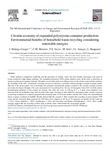Circular Economy of Expanded Polystyrene Container Production: Environmental Benefits of Household Waste Recycling Considering Renewable Energies

Use this link to cite
http://hdl.handle.net/2183/30612
Except where otherwise noted, this item's license is described as Atribución-NoComercial-SinDerivadas 4.0 Internacional
Collections
- Investigación (FCIE) [1228]
Metadata
Show full item recordTitle
Circular Economy of Expanded Polystyrene Container Production: Environmental Benefits of Household Waste Recycling Considering Renewable EnergiesAuthor(s)
Date
2022-02-02Citation
Hidalgo-Crespo, J., Moreira, C.M., Jervis, F.X., Soto, M., Amaya, J.L., Banguera, L., 2022. Circular economy of expanded polystyrene container production: Environmental benefits of household waste recycling considering renewable energies. Energy Reports 8, 306–311. https://doi.org/10.1016/j.egyr.2022.01.071
Abstract
[Abstract] Plastic industry is ubiquitous worldwide, and the generation of “plastic waste” has been steadily increasing to the point of being considered a high impact pollutant. The expanded polystyrene (EPS) plastic industry aware of the issue is interested on trying recycling post-consumer material. Through a recent study made in an alliance between the private sector and the academy, the feasibility of the EPS “mechanical” recycling was proven; therefore, a possible solution through a circular economy model. The aim of the present paper was to investigate the potential environmental impacts avoided by the circular economy scenario previously developed, through a life cycle assessment (LCA) performed for the city of Guayaquil, where 64% of all the plastic manufacturing industries in the country are located. The entire life cycle of 1.00 kg of 5 × 5 inch. food containers were assessed from the production stage until its end-of-life stage: focusing on three different valorization paths, circular economy closed-loop (container-to-container) proposal with electricity share of 2019 and another with the 2027 future one, and traditional linear economy (container-to-landfill). Results showed that the scenario C that considers the recycling of post-consumer EPS waste and the electricity share proposed for 2027 have lower impacts in 14 out of 16 categories, in specific for the Land use (−31%), Ozone Depletion (−28%), Acidification (−24%) and Terrestrial and Marine Eutrophication (−21%). These results strongly suggest that the recycling of these kind of plastic waste could benefit the environment greatly.
Keywords
Recycling
Single-use plastics
Expanded polystyrene (EPS) waste
Circular economy
Life cycle assessment (LCA)
Renewables
Single-use plastics
Expanded polystyrene (EPS) waste
Circular economy
Life cycle assessment (LCA)
Renewables
Editor version
Rights
Atribución-NoComercial-SinDerivadas 4.0 Internacional
ISSN
2352-4847






